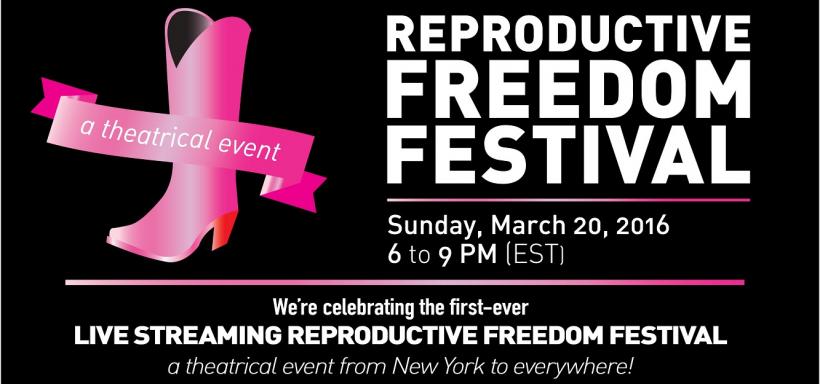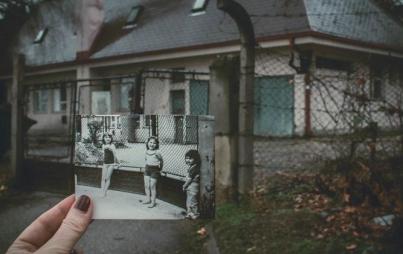
“The access to reproductive rights has gotten worse. Opponents are starting to succeed.” Image: Words Of Choice.
“I never thought that in 2016 women would still be fighting for autonomy over their own bodies.”
The upside of the digital age is the ever-expanding reach of the Internet's potential to bring people together and make information available. Mark your calendars for The Reproductive Freedom Festival on the evening of March 20.
Over three hours of live performances will be streamed from a studio in Manhattan to viewers across the country — and the world. It will be accessible via computers and other digital devices for free. Pre-show highlights begin at 5:15 pm EST.
The goal of the event is to foster awareness of and focus attention on the issue of reproductive rights and bodily autonomy, while anchored in Women’s History Month. A full range of concerns will be addressed: Beyond abortion and contraception, there are pieces examining pregnancy, menopause, gender-based violence, and clinic harassment.
The production is spearheaded by three women: Cindy Cooper, Stacey Linnartz, and Kathryn Velvel Jones. Cooper was at the Center for Reproductive Rights when she hit upon the idea of using theatre as a form of “alternative media” to present material that deals with complicated subject matters. She founded Words of Choice and has been mounting theatrical tours for 13 years.
Actor, drama teacher, and Executive Producer of Third Wing Media, Stacey Linnartz is the artistic consultant on the project. Associated with Words of Choice for almost a decade as both a director and a performer, Linnartz embodies the concept of the artist/activist using theatre to make an engaged political statement.
Cutting-edge tech innovator Kathryn Velvel Jones has been leading the way in live-streaming the arts since 2007. Her company, VirtualArtsTV, takes theatre performances out of brick-and-mortar settings to create interactive mashups — engaging viewers on numerous platforms. Using a multi-camera set-up and real-time editing, the results recall the excitement of live television during the 1950s.
I spoke to Cooper and Jones by telephone to learn more about their process and goals for The Reproductive Freedom Festival.
Referencing her travels across the nation to over 20 states to present pieces from her repertory, Cooper said, “People are hungry for other voices.” In Fort Meyers, Kansas, a woman told Cooper, “I’ve never heard anyone say the things you’re saying.” For the first time, women were hearing that birth control use is OK, and that they “have a right to make decisions about their own bodies.”
Cooper saw the appetite for the type of content that Words of Choice was offering. “We were giving people a different way to think about things,” she said. Recognizing the power of tapping into a visceral source of emotion, Cooper noted, “We’re using the arts and theatre to touch hearts and minds — while educating.”
Personal stories cut through the dogma, permitting a way to reframe entrenched points of view. Cooper used the example of a story that portrays a father recounting his daughter’s rape.
Using an open call process, 150 submissions were reviewed. Those chosen represent 25 states, seven countries, multiple generations, and diverse backgrounds. Formats include plays, spoken word, and poetry. 30 actors will take part.
The shackling of women prisoners while they give birth — an American shame — is examined in two different pieces. One is from the experience of the mother; the other captures the reaction of the delivering doctor. In order to reach women within the Irish time zone — where abortion is banned in the Republic of Ireland and only legal in Northern Ireland within stringent situational guidelines — two “curtain-raisers” are being performed before the main event. The work originates from the Homework Collective.
Jones ran down the logistics of how the interactive elements will be put into play: Using the hashtag #ReproRights on Twitter, and via a designated chat room, viewers will be able to comment and have a dialog with those in the studio. There will be a designated person who will handle the social media and communicate with the audience. During the 30-minute sets, tweets from online viewers will be projected onto the wall in the studio, completing the circle of connection.
“I never thought that in 2016 women would still be fighting for autonomy over their own bodies,” Jones underscored, emphasizing why the project is so important to her. “I've seen the way that both art and live-streaming have successfully ignited national audiences around crucial political issues. So I jumped on this opportunity. We can engage women and men all over the country in support of reproductive freedom.” She added, “My goal is for my nieces and their daughters to never have to fight for their basic human rights.”
With a live-streaming event, Cooper was able to avoid the difficulties of traveling and some of the incidents that occurred — like being “censored in certain places.” Instead, as she pointed out, the event will create a different kind of experience. Art and music will be featured during the breaks. Listening packets are available by request at ReproductiveFreedomFestival@gmail.com. The packets outline a primer on reproductive justice, the evening’s programming, discussion and activism tips, and a resource list.
Despite her excitement about the scope and potential reach of the Reproductive Freedom Festival, Cooper was clear about her concerns. “We’re in dire straits,” she said. “The access to reproductive rights has gotten worse. Opponents are starting to succeed.”
In June 2015, a Pew Research Center Poll showed that 55 percent of Americans believed that abortion “should be legal in all or most cases.” Based on those stats, there apparently is a disconnect.
Tune in on March 20, join the party, and make your voice heard!








